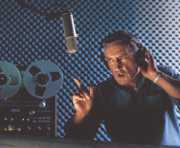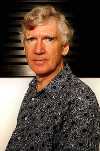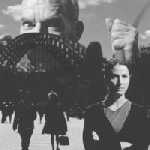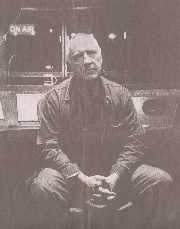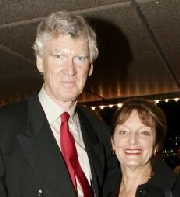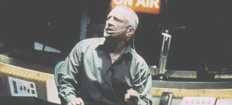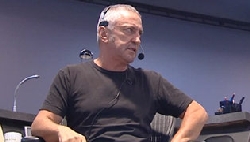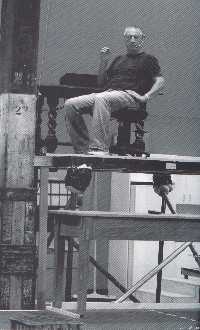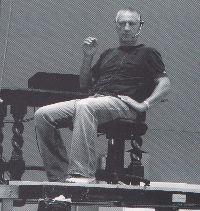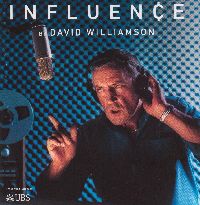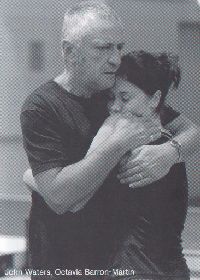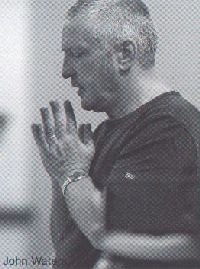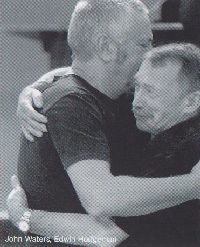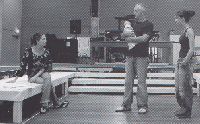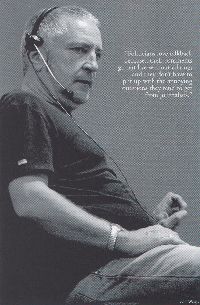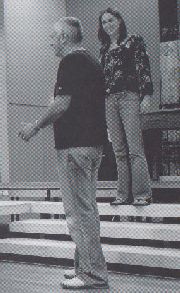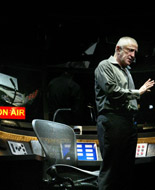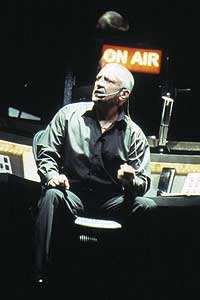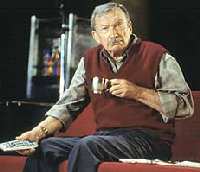Williamson exerts some influence By Rebecca Baillie for the 7.30 Report
There is no name linked more to Australian theatre than that of David Williamson.
He says he has lost count of the number of plays he has written over his 35-year career.
It is just short of Shakespeare's tally of somewhere between 36 and 38 plays, depending on who you reference.
But Williamson's new play, Influence - which premieres with the Sydney Theatre Company before touring nationally - could be his last.
The workaholic has been ordered to slow down and if Influence is his final play, he will be bowing out with some customary controversy.
It tackles the power of radio's so-called shock jocks and some are not necessarily happy with his portrayal.
Like the David Williamson plays before it, Influence tackles a prickly aspect of Australian society.
This time Williamson has the power of radio talkback announcers in his sights.
"Right-wing journalists and radio announcers are so self-righteous that they're ripe for satire," he said.
"I think they actually do social harm because their technique is to amplify anxieties into fears, turn fears into panics and engender a general wave of fear and conservatism."
Williamson insists that his bombastic character Ziggy Blasco, played by John Waters, is not modelled solely on any particular radio host.
Stan Zemanek bills himself as the most complained-about broadcaster in the country. While he maintains that the rabid views of Williamson's radio host don't reflect his own, he is still claiming some credit for the play.
"Maybe David got a little bit of inspiration out of the fact that, yes, I did sell him an apartment in Sydney, and it was quite interesting. He liked my study, so much so that he wanted to - in the contract - have the wastepaper basket and the desk that I wrote at," he said.
However Williamson maintains Ziggy is a fictional character.
"I did write some of it at Stan's desk, but I wasn't asking for his vibes to be transmitted to my word processor," he said.
In Influence Williamson also explores the plight of the working poor, through two characters employed in the fictional Ziggy Blasco's household.
"We don't like to think there's a servant class in Australia, but there is. Most of our professionals couldn't exist without a very low-paid servant class."
Williamson's plays have headlined Australian theatre company repertoires since the early 1970s, when he had international success with The Removalists.
Since then he has written more than one play a year, but says a recently diagnosed heart condition means Influence could be his last.
"But I've poured my heart into it for 35 years, and I'm ready to let the new talent flood the stages," he said.
For actors and directors who have worked with Williamson over the years, it is hard to imagine life on the Australian stage without a new Williamson play.
Actor John Waters, says Williamson is still very popular.
"Sometimes in theatre that seems to be a bad word. I don't know why, because without popular writers like David, I don't think that theatre companies would have survived," he said.
Williamson has no doubt that theatre will survive without him. He plans to spend his time at a more leisurely pace, writing for film, and is happy to let his body of work speak for itself.
"A big thrill in my life is seeing so many of my plays brought to life in such an excellent fashion resonating with the audience, and I've had a very fortunate innings," he said.
Although John Laws and Alan Jones did not wish to be included for this story the ABC understands they are planning to see the play, as is Stan Zemanek.
7.30 Report ABC TV. Transcript.
KERRY O'BRIEN: There is no name linked more to Australian theatre than that of David Williamson. He says he's lost count of the number of plays he's written over his 35-year career. In fact, it's just short of Shakespeare's tally of somewhere between 36 and 38 plays, depending on who you reference. But Williamson's new play, Influence - which premieres with the Sydney Theatre Company tomorrow before touring nationally - could be his last. The workaholic has been ordered to slow down and if, indeed, Influence is his final play, he will be bowing out with some customary controversy. It tackles the power of radio's so-called shock jocks and - surprise, surprise - they're not necessarily happy with Williamson's portrayal. Rebecca Baillie reports.
JOHN WATERS AS ZIGGY BLASCO: What are your pet hates? I'll tell you one of mine - it's our bleeding-heart, over-educated left-liberal elite.
DAVID WILLIAMSON, PLAYWRIGHT: Right-wing journalists and radio announcers are so self-righteous that they're ripe for satire.
JOHN WATERS AS ZIGGY BLASCO: Aborigines, ethnic minorities, gays, women, other-abled, left-handed lesbians - you name it, they're suffering.
STAN ZEMANEK, RADIO BROADCASTER: I don't know any of those radio announcers that go and stir up hatred, that promote racism on radio. I don't know any of them.
REBECCA BAILLIE: It's the latest offering from Australia's premier playwright, and like the 34 or so David Williamson plays before it, 'Influence' tackles a prickly aspect of Australian society.
JOHN WATERS AS ZIGGY BLASCO: Hey, the switchboard's lit up!
JOHN LAWS, RADIO BROADCASTER: You're just plain stupid.
STAN ZEMANEK: Probably been sitting on your bum for the last 10 years collecting the bloody dole. ALAN JONES, RADIO BROADCASTER: Well, I tell you what, the public are sick of all of this. Oh, give us a break, will you? For God's sake! What is going on?
REBECCA BAILLIE: This time, David Williamson has the power of radio talkback announcers in his sights. STAN ZEMANEK: Well, I am speaking for Australia, you fool!
DAVID WILLIAMSON: I think they actually do social harm because their technique is to amplify anxieties into fears, turn fears into panics and engender a general wave of fear and conservatism.
STAN ZEMANEK: It is about 13 minutes after 9. This is the Stan Zemanek program right around Australia. I don't prey on people's fears and I don't promote people's fears and I don't amplify people's fears. They're calling me and saying, "Stan, I am concerned about a particular issue in this country." It's my job as a broadcaster to, I suppose, talk to them, to debate the issue with them, to agree or disagree.
FEMALE CHARACTER IN PLAY: Muslim extremists are a tiny minority.
JOHN WATERS AS ZIGGY BLASCO: It only takes one extremist to arrive at Sydney Airport, self-infected with the ebola virus, and half the city's population could be wiped out.
FEMALE CHARACTER IN PLAY: Don't be so alarmist!
REBECCA BAILLIE: David Williamson insists that his bombastic character Ziggy Blasco, played by John Waters, is not modelled solely on any particular radio host.
STAN ZEMANEK: But at the end of the day, if you can't solve the problem, then it's either the cane or the strap.
REBECCA BAILLIE: Stan Zemanek bills himself as the most complained-about broadcaster in the country. While he maintains that the rabid views of Williamson's radio host don't reflect his own, he's still claiming some credit for the play.
STAN ZEMANEK: Maybe David got a little bit of inspiration out of the fact that, yes, I did sell him an apartment in Sydney, and it was quite interesting. He, I think, liked my study, so much so that he wanted to - in the contract, he wanted to have the wastepaper basket and the desk that I wrote at. DAVID WILLIAMSON: I did write some of it at Stan's desk, but I wasn't asking for his vibes to be transmitted to my word processor. I guarantee you, it is a fictional character, and it is just ironic that this play was written on Stan's desk.
CHARACTER IN PLAY: Ziggy thinks he's paying good money, but I'll tell you something - he's not. FEMALE CHARACTER IN PLAY#2: Don't talk to me about it. In the last 10 years, I've not saved one cent. Our rent takes most of it.
REBECCA BAILLIE: Influence is not a one-issue play. Williamson also explores the plight of the working poor, through two characters employed in the fictional Ziggy Blasco's household.
DAVID WILLIAMSON: We don't like to think there's a servant class in Australia, but there is. Most of our professionals couldn't exist without a very low-paid servant class.
ROBYN NEVIN, SYDNEY THEATRE COMPANY: David's plays are, I think somebody suggested recently, a social history in the making, so inevitably they're going to connect with the prevailing dinner-time conversations.
REBECCA BAILLIE: David Williamson's plays have headlined Australian theatre company repertoires since the early 1970s, when he had international success with The Removalists. Since then he's written more than one play a year, but says a recently diagnosed heart condition means Influence could be his last. The doctor's said to you you should slow down?
DAVID WILLIAMSON: Yep, very definitely. But I've poured my heart into it for 35 years, and I'm ready to let the new talent flood the stages.
ROBYN NEVIN: Actually, normally by this time of this year he's brought me a play to consider for the following year, and he hasn't done that yet, so maybe he is serious.
REBECCA BAILLIE: For actors and directors who've worked with David Williamson over the years, it's hard to imagine life on the Australian stage without a new Williamson play.
JOHN WATERS, ACTOR: He's very, very popular, and sometimes in theatre that seems to be a bad word. I don't know why, because without popular writers like David, I don't think that theatre companies would have survived.
REBECCA BAILLIE: David Williamson has no doubt that theatre will survive without him. He plans to spend his time at a more leisurely pace, writing for film, and is happy to let his body of work speak for itself.
DAVID WILLIAMSON: A big thrill in my life is seeing so many of my plays brought to life in such an excellent fashion resonating with the audience, and I've had a very fortunate innings.
KERRY O'BRIEN: We did approach broadcasters John Laws and Alan Jones for tonight's story. While they didn't wish to be included, we understand they are planning to see the play, as is Stan Zemanek. Rebecca Baillie with that report.
